

Overworked America: 12 Charts That Will Make Your Blood Boil. Illustration: Mark Matcho; Chart Artwork: Jeff Berlin Want more rage?
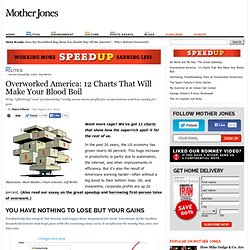
We've got 11 charts that show how the superrich spoil it for the rest of us. In the past 20 years, the US economy has grown nearly 60 percent. This huge increase in productivity is partly due to automation, the internet, and other improvements in efficiency. But it's also the result of Americans working harder—often without a big boost to their bottom lines.
You have nothing to lose but your gains Productivity has surged, but income and wages have stagnated for most Americans. Growth is back... ...But jobs aren't Sorry, not hiring The sectors that have contributed the most to the country's overall economic growth have lagged when it comes to creating jobs. The wage freeze Increase in real value of the minimum wage since 1990: 21% Increase in cost of living since 1990: 67% One year's earnings at the minimum wage: $15,080 Income required for a single worker to have real economic security: $30,000 Working 9 to 7 Labor pains. Mark Zuckerberg says connectivity is a basic human right – do you agree? It's good to talk … Facebook founder Mark Zuckerberg believes the world is better off connected.
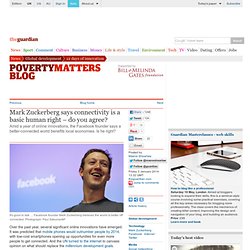
Photograph: Paul Sakuma/AP Over the past year, several significant online innovations have emerged. It was predicted that mobile phones would outnumber people by 2014, with low-cost smartphones opening up opportunities for even more people to get connected. And the UN turned to the internet to canvass opinion on what should replace the millennium development goals. In August, Facebook founder Mark Zuckerberg announced that he aimed to get every person on the planet online.
This followed the 2010 launch of Facebook Zero, a text-only version of the site with no data charges. Wikipedia also got in on the act. In October, Wikipedia joined forces with Airtel to provide Wikipedia Zero by SMS for the first time in Kenya. The most recent partnership announced by Wikipedia is in Burma, which has a 10% mobile phone penetration rate, one of the lowest in the world. Rwanda Rising: A New Model of Economic Development. Nobody likes to say "No, Mr.
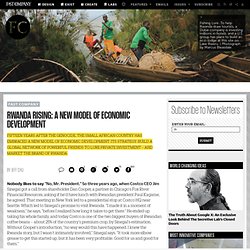
President. " So three years ago, when Costco CEO Jim Sinegal got a call from shareholder Dan Cooper, a partner in Chicago's Fox River Financial Resources, asking if he'd have lunch with Rwandan president Paul Kagame, he agreed. That meeting in New York led to a presidential stop at Costco HQ near Seattle. Which led to Sinegal's promise to visit Rwanda. "I made it in a moment of weakness," he says, "before I realized how long it takes to get there.
" Very good for Rwanda, in fact. The courtship of Sinegal is a clarion example of Rwanda's strategy for development. Sinegal. Kagame's strategy relies on wealthy and powerful friends to lure private investment, train a new generation of managers, build a globally competitive economy, and wean the country off foreign aid. Just as the Asian Tigers arose as export-led, middle-income economies in the 20th century, Rwanda wants to become the African Gorilla in the 21st.
On a good day, Rwanda sparkles like an emerald. December 2013. SOURCE: AP/M.
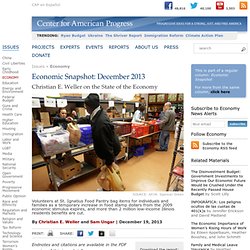
Spencer Green Volunteers at St. Ignatius Food Pantry bag items for individuals and families as a temporary increase in food stamp dollars from the 2009 economic stimulus expires, and more than 2 million low-income Illinois residents benefits are cut. By Christian E. Weller and Sam Ungar | December 19, 2013 PRINT: SHARE: Download the report: PDFRead it in your browser: Scribd Endnotes and citations are available in the PDF version of this issue brief. People are angry at the policy responses to the economy’s subpar performance because policymakers seem to have given up trying to help the millions of Americans who are still struggling. But American citizens should not be satisfied and should demand more. The current economy only works for those lucky few with high incomes who depend in large measure on corporate profits through dividends and stock market gains for their financial well-being. Policymakers need to focus on building an economy that works for everybody.
5 Reasons Congress Must Extend Unemployment Insurance. SOURCE: AP/J.
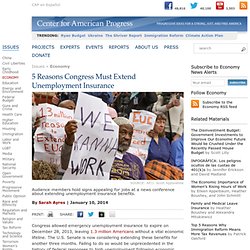
Scott Applewhite Audience members hold signs appealing for jobs at a news conference about extending unemployment insurance benefits. By Sarah Ayres | January 10, 2014 Congress allowed emergency unemployment insurance to expire on December 28, 2013, leaving 1.3 million Americans without a vital economic lifeline. Infographic: How Far We’ve Come and How Far We Need to Go.